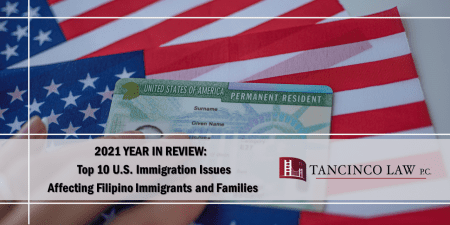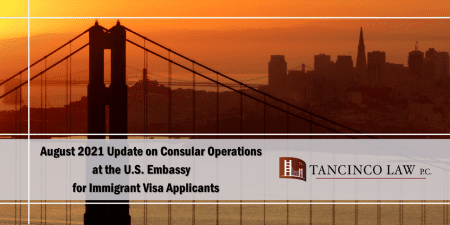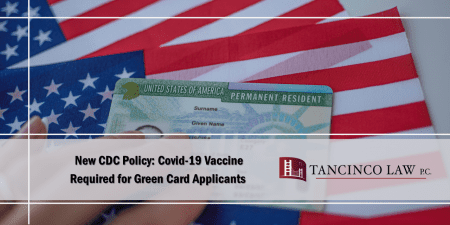Two years since the start of the pandemic, reality has already set in not just in our personal lives but also in the immigration front. With the surge in the different variants of covid, we are nowhere close to returning to normal.
To recap this year’s top immigration issues, we are summarizing a few of the key changes that happened this year.
1. Filipino World War II Veterans Parole Program (FWVP) Is Alive
On top of my list is the FWVP program that will benefit certain family members of Filipino World War II veterans who were naturalized as U.S. citizens under the Immigration and Nationality Act of 1990.
After a proposal to terminate the FWVP program under the past Trump Administration, the U.S. Citizenship and Immigration Services reversed its proposed termination. On September 29, 2021, USCIS published on its website that it will continue the FWVP program. Current parolees who benefited from the program may continue to apply for extensions. Also, it announced that USCIS is accepting new FWVP applications.
Although it is continuing the FWVP program, USCIS mentioned the unpredictability of the processing time adjudicating the FWVP parole at the U.S. Embassy in view of the COVID-19 pandemic closures.
2. Vaccine Mandate for Travelers
On November 8, 2021, the Biden administration implemented a policy for international air travelers flying into the U.S. from most countries. It now requires all non-U.S. citizens and nonimmigrant travelers to have been fully vaccinated prior to boarding a plane to come to the United States.
According to CDC, you are considered fully vaccinated:
- 2 weeks (14 days) after your dose of an accepted single-dose COVID-19 vaccine;
- 2 weeks (14 days) after your second dose of an accepted 2-dose series COVID-19 vaccine;
- 2 weeks (14 days) after you received the full series of an “active” (not placebo) COVID-19 vaccine in the U.S.-based AstraZeneca or Novavax COVID-19 vaccine trials; or
- 2 weeks (14 days) after you received 2 doses of any “mix-and-match” combination of accepted COVID-19 vaccines administered at least 17 days apart.
There are exceptions to this rule. First, travelers who are under the age of 18 are exempted from this requirement. Instead, minors aged 2 to 17 must test negative prior to departure. Second, persons who have a pertinent medical condition are exempted. Third, people from countries with less than a 10% total vaccination rate due to lack of availability of vaccines are also exempted. CDC’s website is providing and constantly updating the list of such countries with limited vaccine availability. However, they must agree to be vaccinated within 60 days of arrival in order to enter the U.S.
These new vaccine rules do not apply to U.S. citizens, U.S. nationals, or U.S. lawful permanent residents.
Unvaccinated travelers — whether U.S. citizens, lawful permanent residents, or the small number of exempt unvaccinated foreign nationals — will now need to test within one day of departure.
3. COVID-19 Hate Crime Act Passed Into Law
In response to the rising cases of Anti-Asian rhetoric and hate crimes impacting our community, President Biden signed into law on May 20, 2021 the COVID-19 Hate Crimes Act (Pub L.117-13). This new legislation addresses hate crimes throughout the COVID-19 pandemic.
It includes critical provisions to expand language access and allow for culturally competent and linguistically accessible public education campaigns to reach communities targeted by hate with information regarding reporting and support services. It improves data collection and law enforcement policies on identifying, investigating, and reporting hate crimes, provides grants for state-run hotlines for reporting and connection to support services, and creates opportunities to restore communities and address the root causes of hate crimes through alternative sentencing for offenders. Investing in better quality data and reporting infrastructure are vital in addressing racial equity for the long-term.
4. DACA Update
The past Trump administration attempted to end the DACA program but the U.S. Supreme court overruled the effort in 2020. In July 2021, a Texas federal judge barred the USCIS from processing new requests for DACA protections. As a result of the ruling, no new DACA applications are being adjudicated by the USCIS.
The Biden administration nonetheless moved to codify the program in a regulation to give it a stronger foundation against legal attacks.
Those who had prior DACA protections may continue to avail of deportation relief and work permits. Efforts to pass a legislation that will afford a pathway to citizenship to hundreds of thousands of unauthorized immigrants who were brought to the U.S. as children did not materialize this year.
5. Trump’s Public Charge Rule Rescinded
Public charge rule determines if immigrants should be denied green cards or prevented from entering the United States because they may become financial burdens on the government.
In 2019, former President Trump released a “wealth test” public charge rule with very restrictive requirements and extensive documentation. This Trump’s rule is no longer in effect since March 2021 when a court order vacated the Trump’s Public Charge final rule. Instead, USCIS is using inadmissibility rules based on public charge using USCIS 1999 guidance in applications for admission and adjustment of status.
On August 23, 2021, DHS published an Advance Notice of Proposed Rulemaking and is seeking public input on how to craft the new public charge ground of inadmissibility.
6. Foreign Worker’s Spouse Work Permits
In November 2021, spouses of certain foreign workers in the U.S. won a victory when a settlement was reached by their lawyers and the U.S. Citizenship and Immigration Services over its policies for issuing employment authorizations.
Pursuant to the settlement, USCIS agreed to change its policies regarding work permits for those who are eligible for H-4 and L-2 visas based on their partners’ status as H-1B specialty workers or executives transferred to the U.S. The H-4 visas are for spouses of H-1B visa holders, and the L-2 visas are for spouses of executives holding L-1 visas.
Those who hold L-2 visas will be allowed to work in the U.S. by default, and those with H-4 visas will be eligible for an automatic extension of their current work permits for up to six months if they satisfy certain criteria, according to the settlement agreement.
7. No More Mass Worksite Raids
The Biden administration announced on October 12, 2021, that it would no longer conduct “mass worksite enforcement operations” which means raiding workplaces to arrest undocumented workers. This announcement puts an end to the Trump-era policy.
U.S. Department of Homeland Security Secretary Alejandro Mayorkas said that such shift is to focus more on “employers who exploit the vulnerability of undocumented workers” than migrant workers. He added that undocumented workers have been victimized by human trafficking, child exploitation, substandard wages, and impose unsafe working conditions only because of their lack of immigration status. Secretary Mayorkas also shared that by prioritizing workplace enforcement against “unscrupulous employers”, “the American labor market, the conditions of the American worksite, and the dignity of the individual” can be protected most effectively.
As a result of this shift in workplace enforcement, it is expected that undocumented worker would speak out against unjust treatment and exploitation without fear of arrest and deportation, as previous worksite enforcement operations have led to the arrests of hundreds of workers at once.
8. Waiver of Interview at the U.S. Embassy Manila for Certain Non-immigrants
Repeat travelers to the United States may, under some circumstances, renew their visas without appearing at the U.S. Embassy for an interview. To avail of the Interview Waiver , an applicant must have a B1/B2, F, M or J nonimmigrant visa that expired within 48 months from date of renewal and must meet certain qualifications. If eligible an applicant for renewal may be able to drop his/her visa application at a 2GO courier office location.
9. Backlog of Immigrant & Non-immigrant Visa Interviews at the U.S Embassies
COVID-19 resulted in a severe backlog of immigrant cases waiting for interviews. An immigrant visa applicant who is declared “documentarily qualified” by the National Visa Center may have to wait longer for a scheduled interview because of the backlog of cases.
Worldwide, there were 461,125 applicants pending interviews in the month of November 2021. Of this number, only 28,964 were scheduled for interviews by the U.S. Embassies worldwide. The rest remains pending.
The U.S. Embassy in Manila schedules interviews following a 4-tier guideline as follows:
- Tier One: Immediate relative intercountry adoption visas, age-out cases (cases where the applicant will soon no longer qualify due to their age), and certain Special Immigrant Visas (SQ and SI for Afghan and Iraqi nationals working with the U.S. government)
- Tier Two: Immediate relative visas; fiancé(e) visas; and returning resident visas
- Tier Three: Family preference immigrant visas and SE Special Immigrant Visas for certain employees of the U.S. government abroad
- Tier Four: All other immigrant visas, including employment preference and Diversity Visas
Nonimmigrant Visa (NIV):
The US Embassy continues to prioritize travelers with urgent (i.e. matter of life and death) travel needs, foreign diplomats, and certain mission-critical categories of travelers, such as students and exchange visitors (F-1, M-1, and J-1) and temporary employment visas (H-1B, H-2B, and L nonimmigrants). Visa appointments and processing for B1/B2 (Business/Tourist) have resumed at significantly reduced levels.
10. Philippines EB3 Preference Category Priority Date Remains Current
For more than a year now, and as may be observed from the latest December 2021 visa bulletin issued by the Department of State, visa applicants under the employment-based third preference (often referred to as EB3) category visa remains current.
When a priority date for a visa petition is current, it means that the visas are available.
There are a significant number of Filipino professionals who are beneficiaries of existing EB3 petitions. But we also know that there are many more Filipino nurses and physical therapists who are already pre-certified and can immediately take advantage of this visa availability. Schedule A occupations are those jobs for which there are not a sufficient number of U.S. workers who are able, willing, qualified, and available to fill the number of available jobs that exist in the United States, and the wages and working conditions of U.S. workers similarly employed will not be affected by the employment of foreign workers in Schedule A occupations.
Other health care workers such as licensed vocational nurses (LVNs), licensed practical nurses (LPNs), certified nurse assistants (CNAs), as well as nurses’ aides and caregivers do not qualify for Schedule A precertification. However, they may still qualify and benefit under this concurrent filing if they have approved Labor Certifications or PERMs.
Our Renewed Hope for 2022
In his first year of office, President Biden made modest changes to US immigration policy but we have also been waiting to see legislation that provides a pathway to citizenship for the millions of unauthorized immigrants.
While President Biden unveiled his immigration reform, the U.S. Citizenship Act of 2021 which included an 8-year path to citizenship for millions of unauthorized immigrants, no significant movement has been made in Congress. This bill has yet to be voted on by the House and the Senate. While the Democrats attempted to include immigration provisions in the Build Back Better Act, this bill was never passed by the Senate. To make matters worse, Senate parliamentarians opposed the inclusion of the immigration measures on a spending bill.
While Democrats are in control of both the House and the Senate, it is so hard to to pass any bills due to a very divided Congress with very partisan issues dividing both. The Senate requires 60 votes to pass a bill and with the 50-50 split between Democrats and Republicans, passing any legislation is no easy task. Nevertheless, the new year brings new hope and new beginnings. Happy New Year to all!
(Atty. Lourdes Santos Tancinco, Esq. is an immigration attorney with the Tancinco Law P.C., a San Francisco CA based law firm. She may be reached at 1 888 930 0808, law@tancinco.com , facebook.com/tancincolaw, or through her website www.tancinco.com.)




